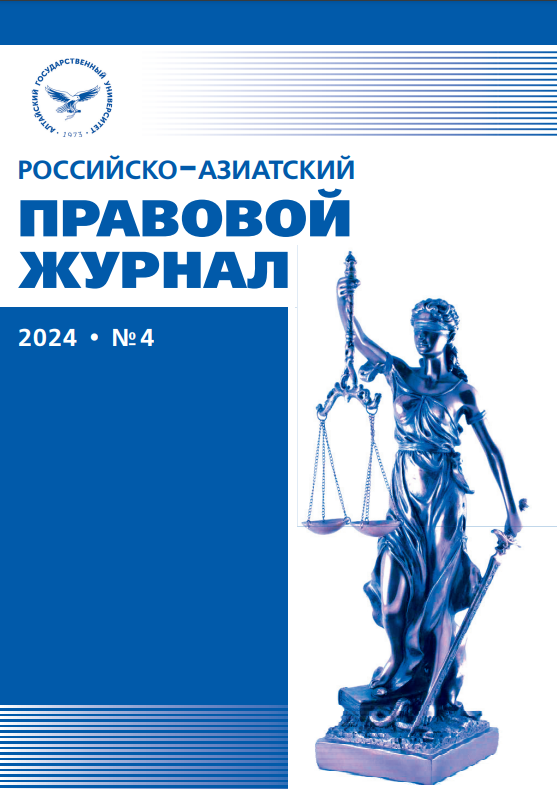LEGAL ASPECTS OF ENVIRONMENTAL MANAGEMENT IN NORTHEAST CHINA IN THE FIRST HALF OF THE 20TH CENTURY
УДК 349.414 ББК 67.407
Abstract
The state of China's natural resource potential in the first half of the 20th century was assessed as verysatisfactory. This was explained, on the one hand, by the fact that China was a predominantly agriculturalstate, on the other hand, by the small population in the country.The prerequisites for the formation of legislation regulating public relations related to the involvementof certain natural resources in economic turnover are the resolutions adopted in ancient China during theimperial rule. The legal foundations of environmental management in the studied period of time — the first half of theXX century — developed quite actively. However, most of the legislative provisions regulating certain issuesin the field of environmental management were very fragmentary. The insufficiency of legislative regulation,at times, was often compensated by the adopted instructional materials, which were distributed to a limitedlist of territories, in particular, for example, those operating exclusively within the borders of the territory ofNorthern Manchuria. This, in turn, made it possible to put forward a judgment on the claims of the Manchupeoples to certain natural resources in China in the first half of the 20th century.The purpose of the research is to determine the role of regulatory legal acts regulating certain issues inthe field of environmental management in Northeast China in the first half of the 20th century.According to the results of the study, the author concludes that the legal regulation of public relationson the use of certain natural resources in the first half of the 20th century became the basis for the formationof natural resource legislation, the development of which was based, among other things, in the interests ofthe peoples of Northern Manchuria.
Downloads
References
Рязановский В.А. Основные начала земельного, горного и лесного права Китая. Харбин, 1928.
Лю Хунянь. Развитие экологического права Китая и России. М. : Городец, 2008.
Дудин П.Н. Институты публичной власти у маньчжуро-монгольских народов Восточной Азии в первой половине ХХ в. (часть 1: Имперский политический по рядок) // Политическая экспертиза: ПОЛИТЭКС. 2022. Т. 18, №4.
Известия юридического факультета. Т. 6. Харбин : Отделение типографии Китайской Восточной железной дороги, 1928.
Варавенко В.Е. Становление и развитие договорного права Китайской Народной Республики // Журнал зарубежного законодательства и сравнительного правоведения. 2012. №2.
Яшнов Е.Е. Китайское крестьянское хозяйство в Северной Маньчжурии. Экономический очерк. Харбин : Типография Китайской Восточной железной дороги, 1926.
Copyright (c) 2024 Д.А. Фицай

This work is licensed under a Creative Commons Attribution 4.0 International License.
Russian-Asian Law Journal is a golden publisher, as we allow self-archiving, but most importantly we are fully transparent about your rights.
Authors may present and discuss their findings ahead of publication: at scientific conferences, on preprint servers, in public databases, and in blogs, wikis, tweets, and other informal communication channels.
Russian-Asian Law Journal allows authors to deposit manuscripts (currently under review or those for intended submission) in non-commercial, pre-print servers such as ArXiv.
Authors who publish with this journal agree to the following terms:
- Authors retain copyright and grant the journal right of first publication with the work simultaneously licensed under a Creative Commons Attribution License that allows others to share the work with an acknowledgement of the work's authorship and initial publication in this journal.
- Authors are able to enter into separate, additional contractual arrangements for the non-exclusive distribution of the journal's published version of the work (e.g., post it to an institutional repository or publish it in a book), with an acknowledgement of its initial publication in this journal.
- Authors are permitted and encouraged to post their work online (e.g., in institutional repositories or on their website) prior to and during the submission process, as it can lead to productive exchanges, as well as earlier and greater citation of published work (See The Effect of Open Access).








